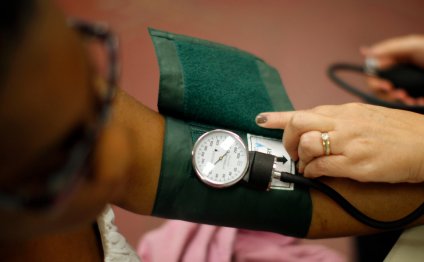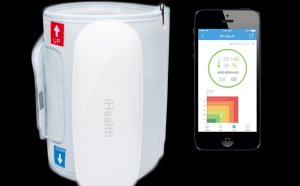
Blood pressure Monitor for Doctors office
 One of the biggest health problems in the United States today is high blood pressure. It is reaching epidemic proportions. Often a silent killer, high blood pressure may show no symptoms until levels are very elevated. I see high blood pressure and its consequences every day in my patients.
One of the biggest health problems in the United States today is high blood pressure. It is reaching epidemic proportions. Often a silent killer, high blood pressure may show no symptoms until levels are very elevated. I see high blood pressure and its consequences every day in my patients.
In our cardiology practice, approximately one-half to two-thirds of people who come in for evaluation of heart rhythm disorders already have high blood pressure. It is one of the most common causes of atrial fibrillation, heart failure, and stroke.
We check blood pressure levels on all of our patients as a routine part of a heart examination. More often than not, I have the following conversation.
“Mr. Smith, your blood pressure today is high at 160/85 mmHg, ” I say.
“I don’t have high blood pressure, I have white coat hypertension, ” he replies. Or, “I check my blood pressure all the time at home and it’s never that high.”
I would estimate three-fourths of my patients will say either their blood pressure is high, or higher than normal, because of what they think is “white coat hypertension.” But what they might not realize is that even if it is higher in the office than at home, it can put them at risk for heart disease.
White Coat Hypertension: When Stress Spikes Blood Pressure
What is white coat hypertension? It is a condition in which your blood pressure is higher in a physician’s office, but is otherwise normal.
What makes your blood pressure go up in a doctor’s office? Most people say they are anxious or worried they may receive bad news. Or it may be the cost of their appointment or of medical care. Anxiety and stress are important causes of blood pressure elevation.
To take your blood pressure, ideally you should be seated and relaxed. And typically, once seated, you should wait three to five minutes before measuring your blood pressure. Then, the best practice is to take three measurements in each arm and average the readings.
Most of you are probably thinking that this never happens when you see a doctor, because most offices are busy and check people in quickly without taking the time to correctly measure your blood pressure. But if you go to a high blood pressure clinic, this process will sound familiar.
Our blood pressures all go up with activity and stress. In fact, we use blood pressure change as a measurement in cardiac (heart) stress tests. If your blood pressure goes down during stress, that usually is a sign of disease. So, if you are rushed into a clinic office and your blood pressure is taken immediately, it will probably be higher than expected. If this is the case, you can always ask that your blood pressure be retaken after you have had a chance to sit down for a few minutes.
Another important aspect to consider is that not all blood pressure machines and devices are the same. Blood pressure devices are only as good as the readings they provide. Most adults need a full-size or adult-size, large blood pressure cuff that goes around the upper arm. Smaller devices that are placed on the wrist or ankle tend to be less accurate.
If you have a blood pressure machine you use at home, bring it in to your doctor’s office and compare readings. Oftentimes, we will find the measurements are similar. However, at times we find that the home machine reading is either too high or low. Most of the time, we find that the blood pressure cuff is too small.
Assuming your blood pressure is measured correctly, and in the office it is still higher than at home, does white coat hypertension matter? The general sense of my patients is no, because the blood pressure values are not the same as those measured at home. I agree with this partially, as errors can occur in a doctor’s office. But what is important to consider is that the doctor’s office blood pressure measurements can give you some insight into how your body deals with situational stress.
We all face many stresses each day, many of which we cannot avoid. These may come from our jobs, commutes, spouse or family relationships, financial issues, health problems, and more. If each time we face stress our blood pressure skyrockets to very high levels, our hearts can be strained and injured. In this regard, white coat hypertension that reflects our response to stress can be a marker of heart disease risk.
White Coat Hypertension, Stress, and Heart Disease Risk
A new white coat hypertension study, published in Hypertension in June 2015, looked at heart disease risk. The study included 3, 200 people in Italy. These patients were seen in a doctor’s office for three blood pressure measurements. Then they were sent home with a 24-hour blood pressure monitor that sampled their blood pressure every 20 minutes. When the patients returned, they had three more office blood pressure measurements. With these measurements, the researchers could determine what was happening to the blood pressure in the doctor’s office and throughout the day.
White coat hypertension was diagnosed if the average office blood pressure measurement was higher than 140 mgHg for systolic blood pressure or higher than 90 mmHg for diastolic blood pressure but the 24-hour average blood pressures (at home) were normal.
Then the investigators divided the group with white coat hypertension into two: those who experienced high blood pressure frequently with stress, and those who experienced high blood pressure occasionally with stress.
RELATED VIDEO



Share this Post
Related posts
Omron Upper Arm Blood pressure Monitor
Offering precision and comfort with our Easy-Wrap ComFit Cuff that fits standard and large Arms, the 7 Series Upper Arm Blood…
Read MoreMobile phone Blood pressure Monitor
About 70 years ago, Franklin Roosevelt died of essentially untreated hypertension, with years of exams describing a progression…
Read More











